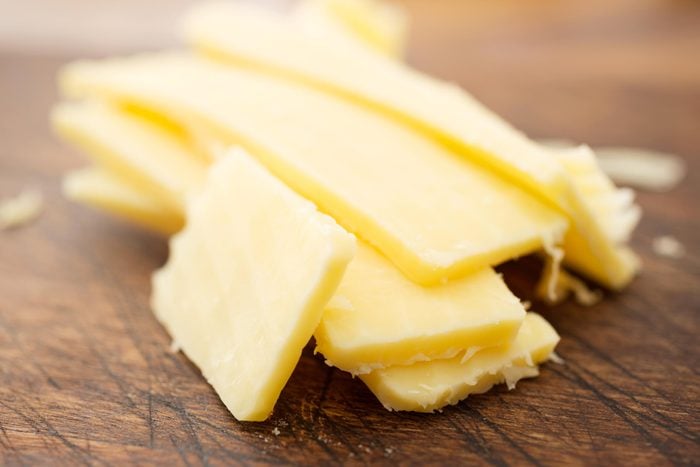
I confess that this story happened by chance, not as an assignment. When the holidays approached, my partner and I stocked up on some groceries that, admittedly, were slightly more indulgent than we grab for a typical week. In particular, when we know there’s some leisure time just around the corner, we tend to spend a few extra minutes examining the supermarket cheese case.
We came away with a small armload of Brie and Kerrygold Reserve cheddar. (If you’re a Kerrygold fan, you’ll understand why we needed two blocks.) Already in the fridge at home was one of our favorites: Trader Joe’s Stilton cheese with apricots, as well as the Wisconsin-made Klondike Odyssey peppercorn feta (a first-place winner at the 2022 American Cheese Society Competition that I’d been lucky enough to sample for work) and a block of ultra-sharp cheddar from New Hampshire, which had been delivered in a gourmet gift box from my lovely associate editor.
With this and some other snazzed-up staples—a large fruit bowl, a few dippable veggies for slicing, some milk, eggs, turkey sausage, a loaf of multi-grain bread—our holiday downtime prep was complete. We also grabbed a couple bottles of our favorite bevs, including Kate Hudson’s King St. vodka and Cameron Diaz’s all-organic Avaline wine. The gourmet gift box had also come with a split of one of my faves: LaMarca prosecco.
What Are the Best Foods to Fight Cancer? Here’ What’s in a Cancer Dietitian’s Fridge
If all this sounds like a lot, please try not to judge. My birthday is three days before Christmas, and in lieu of any gifts or plans, I’d asked for a quiet night with a cheeseboard in front of the fireplace. In addition to a few down-to-earth delicacies, my partner and I were craving some very intentional rest. Last holiday season, he had just finished six months battling advanced lymphoma. Then, a few months after we learned he was in remission (thank you, team Cleveland Clinic), he took a job across the country. All this made 2022 a year of intensive activity for us, especially because we have an elderly dog that can’t fly…meaning we made two coast-to-coast journeys by car between July and November. Come December, we were spent.
So to close out the year, eating cheese every day seemed a relatively harmless extravagance. Here are the health effects I noticed—and licensed health professionals explain.
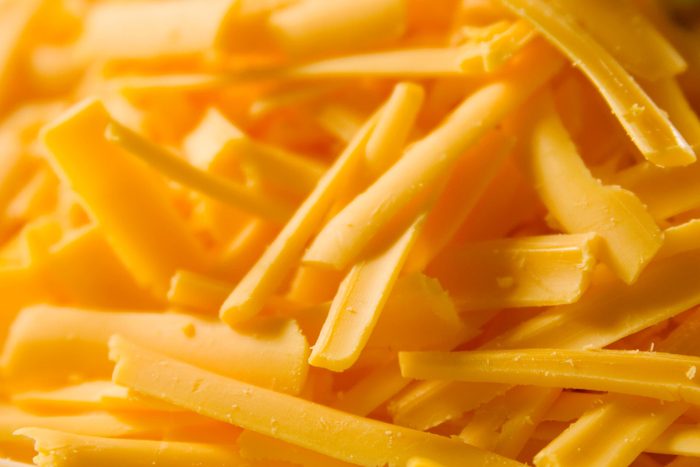
How to eat cheese every day
For me, especially at the holidays, eating cheese every day required no instructions.
Our first morning off from work, we made scrambled eggs with toast and turkey sausage, accompanied by a small bowl of fruit—some pineapple, kiwi, and berries. We had Tillamook’s four-cheese Mexican blend of shredded cheese in the fridge and sprinkled that over the eggs. (My partner loves some heat, usually Tabasco, but in its absence we added a little of Melinda’s Green Sauce with tomatillo, jalapeños, spinach, and cilantro. This substitute became an instant daily addition to the breakfast table.)
I Ate Eggs Every Day for a Week—Here’s What Happened
When we agreed that our tummies had started to growl by the middle of our first afternoon off, I was tickled to remember that we had so…much…cheese…just waiting for some attention. I served up a plate with some Club crackers—a family favorite—though until I studied the ingredients that day, I’d never realized Club actually contain high-fructose corn syrup. We’d also grabbed a box of Milton’s Craft Bakers Original Multi-Grain crackers, which are organic-certified by the US Department of Agriculture. The Milton’s Craft Bakers brand also pledges sustainable practices for the climate. (Milton’s multi-grain flavor is also a just-right balance of wholesome grains that still allow the cheese to star in every bite.)
This served well as a light lunch. The following afternoon, to take to a gathering that night, I pulled out two wheels of Brie: one to top with a thick, homemade applesauce-and-walnut recipe I created a few years ago, and the other with garlic (three heads) that I’d roasted in olive oil and salt inside foil. I wrapped both wheels inside pre-made pie crust, brushed them in egg wash, and let them bake.
Believe it or not, a few days into our restful break, we found our cheese supply dwindling. We re-stocked with a honey goat’s cheese, a jalapeño Havarti, Gouda…and, heaven help us, another block of Kerrygold cheddar.
Eating This Nut May Reduce Heart Disease Risk, New Study Says
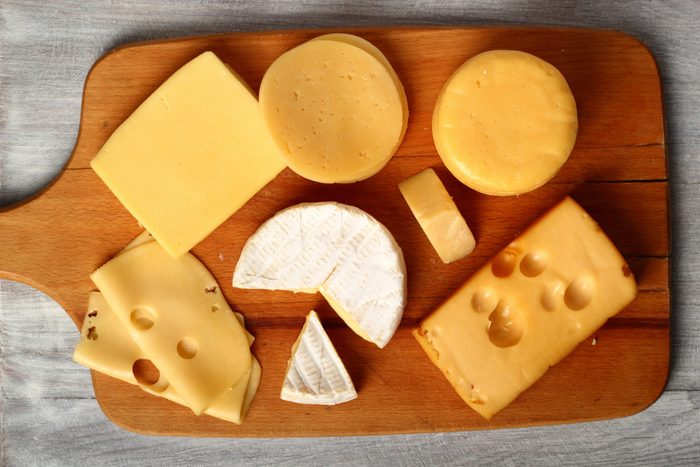
Eating cheese every day for a week
In the midst of all that cheese-snackin’, there were four main observations I made. First, cheese does an awesome job of taking the edge off my hunger. Los Angeles-based, board-certified holistic nutritionist Katie Bressack, INHC, AADP, says that could be because cheese is “a great source of protein.”
However, she notes, cheese “can be high in calories, sodium and saturated fat, which can increase levels of the bad cholesterol (LDL). So you can have it,” Bressack says, “but I wouldn’t have it every day, all day.”
A little late, but…OK. Duly noted.
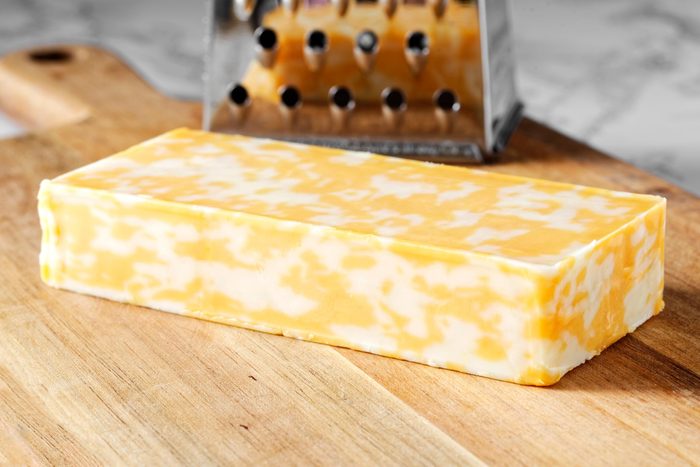
Eating cheese every day for a week made my skin break out
Since I was a pre-teen, my breakouts have always occurred almost exclusively on my chin. When I went to college and stopped drinking milk every night at dinner, I happened to notice that the acne became less frequent.
Lisa Fairman Pfingstler, MD, a board-certified dermatologist in DuBois, PA, says “there is some association” between dairy intake and acne. One study Dr. Pfingstler mentions found that skim milk in particular increased acne, compared to other types of dairy milk.
It probably didn’t help that in general that week, I was eating richer foods—including a few desserts—and taxing my liver a little extra with alcohol.
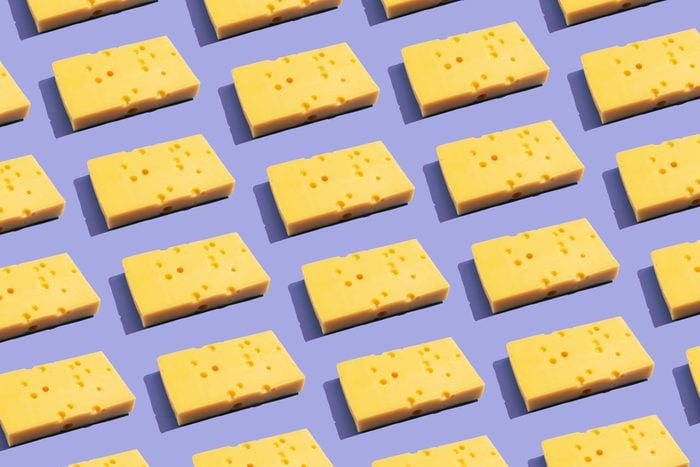
The week I ate cheese every day, I slept really well
Dr. Sara Mednick, PhD, a cognitive neuroscientist at the University of California Irvine and author of the 2022 book, The Power of the Downstate, confirms my observation: cheese definitely seemed to have some impact on helping us catch up on rest. “There is some evidence that dairy in the diet can benefit sleep,” Dr. Mednick says. “Not only is dairy nutritionally rich, but it also contains high amounts of tryptophan, which synthesizes melatonin. Melatonin is the circadian hormone that decreases arousal at night and brings on sleep. So having enough dairy in your daily diet can be a great way to keep your sleep on a steady rhythm.”
Gotta love it.
Can’t Sleep? A New Study Found This Solution Was More Powerful Than Melatonin
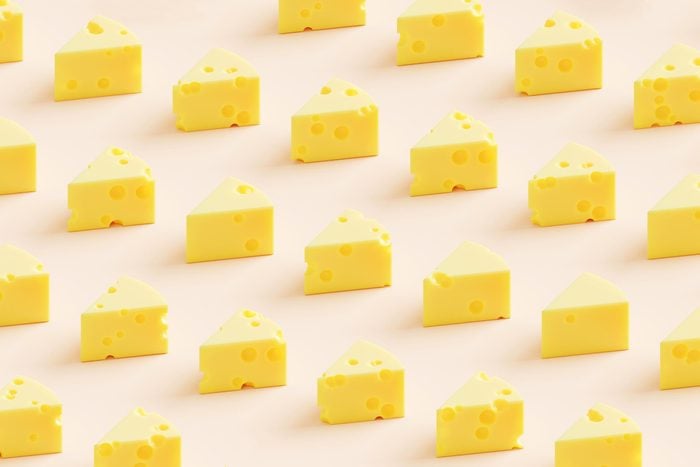
Eating cheese every day didn’t seem to affect my digestive system
I remember hearing years ago that cheese can “bind you up”—or in slightly more polite words, can cause constipation. Happy to report this was not part of my experience.
Ken Brown, MD, a board-certified gastroenterologist in Plano, TX, says we can put the cheese and constipation wives’ tale to rest: “Recent studies have debunked the myth that dairy products, specifically cheese, cause constipation,” he says. “In fact, a study conducted on 21 retirement home residents found that increased cheese consumption had no negative impacts on bowel habits, including intestinal transit time.”
That’s a relief—but even better? “Another study demonstrated that moderate amounts of dairy consumption are associated with reduced odds of constipation,” Dr. Brown says. “This suggests that cheese does not cause constipation and that moderate amounts of dairy consumption may even help prevent it. Therefore, it is safe to say that dairy products, including cheese, do not cause constipation.”

Eating cheese every day made my day
I’ll take nutritionist Bressack’s advice—I won’t continue the daily dairy frenzy. During a regular week, I ensure I eat a minimum of five fruits and vegetables a day.
But I’ll note that at lunchtime one day last week, I decided to finish off the final block of Kerrygold cheddar by pairing it with a sliced Honeycrisp apple. Cheese and an apple…what simple joy, plus some balanced nutrition.
And cheese on crackers? I remember it from childhood as my grandfather’s favorite “midnight snack” (even though he usually ate it around 9 p.m.). My partner loves starting the weekend by eating pepper jack on Ritz with his tea. If cheese makes us happy—and even helps bring us together—then maybe it is one of the best ingredients for a long, happy life.
Get The Healthy @Reader’s Digest newsletter
Follow The Healthy on Facebook, Instagram, and Twitter. Keep reading:

